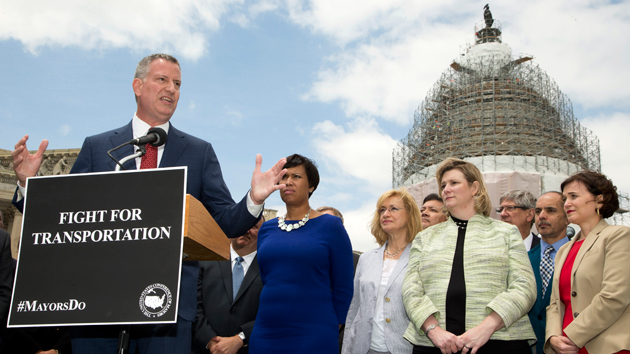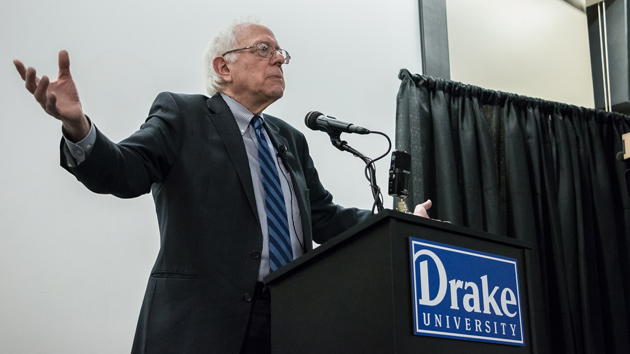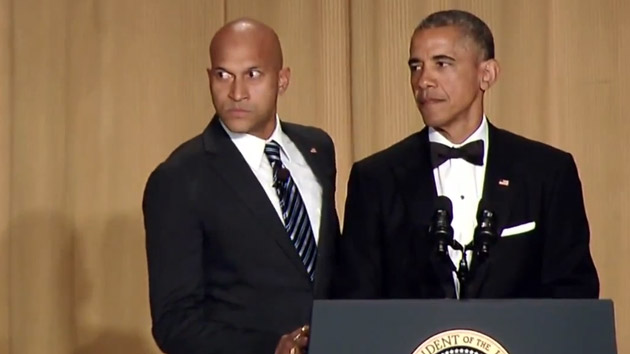
New York City Mayor Bill de Blasio speaks in Washington.Manuel Balce Ceneta/AP Photo
This story originally appeared at Grist and is republished here as part of the Climate Desk collaboration.
At a rally in front of the Capitol in Washington, DC, last week, New York City Mayor Bill de Blasio and fellow liberal Democrats such as Rep. Barbara Lee of California unveiled a national agenda for greater economic equality. The 13-point “Progressive Agenda,” which was heavily influenced by Nobel-winning economist Joseph Stiglitz’s new 100-page report for the Roosevelt Institute on policy solutions to income inequality, is a left-wing wish list meant to echo Newt Gingrich’s 1994 Contract with America.
“The Progressive Agenda” includes plenty of popular, and populist, ideas, from raising the minimum wage to mandating paid employee sick leave. The emphasis is on correcting a system that has been rigged for the benefit of corporations and the wealthy, particularly through the tax code, and replacing it with a fairer system that rewards labor rather than just wealth. The agenda would do a lot to help the US catch up to the policies of other developed countries that have more equitable income and wealth distributions.
Notably absent, though, is practically anything to do with the fossil fuel economy, suburban sprawl, and the policies that prop them up, which are bad for both regular Americans and the climate. De Blasio’s agenda contains a token reference to environmental protection, along with labor rights, as something that shouldn’t be sacrificed to global trade deals. Stiglitz makes brief mention of a carbon tax. But many sources of inequality related to the dirty energy economy—and sources of opportunity that arise from a shift to a clean economy—go unmentioned.
Still, just because these concerns weren’t out front on Tuesday doesn’t mean they’ll be neglected. De Blasio’s climate plan for New York City, unveiled last month, is heavily focused on addressing poverty, so he certainly understands how the issues are linked. And a source with knowledge of de Blasio’s plans said that more Progressive Agendas will be forthcoming and they will address other aspects of economic inequality, possibly including environmental issues.
To help progressive leaders develop such a plan, here’s a list of six policies that would help cut carbon pollution, clean up the air, strengthen our cities, and redistribute tax dollars from fossil fuel companies and rich individuals to the poor and middle class.
- Impose a carbon tax and redistribute the revenue to citizens. Currently, polluters pay nothing when they spew CO2 into the air, despite the massive costs that the emissions impose on society by worsening climate change. Discouraging emissions through taxation of big polluters would help get climate change under control—and it could also generate huge amounts of revenue. That money could be spent in any number of ways; one of the more progressive would be to rebate some of it to low-income taxpayers and use some of it for social programs. Even simply cutting carbon pollution is progressive, since the worst effects of climate change will fall disproportionately on the poor. And by getting our country off of coal and oil burning, we would also reduce the particulate pollution that plagues low-income, minority, and inner-city neighborhoods.
- Eliminate the mortgage interest tax deduction. While de Blasio’s agenda calls for some relatively small-bore tax reforms, this would be the big kahuna, saving at least $70 billion every year. Since homeowners tend to be richer than renters, we’re currently subsidizing housing for the rich more than for the poor. And since renters are more likely to live in cities and homeowners in suburbs, we’re taxing cities to subsidize suburbia and encouraging sprawl. Instead of increasing home ownership, the mortgage interest deduction just helps people buy bigger homes. It’s all a waste of resources: chopping down forests to build new subdivisions and paving new roads ever farther away from city centers, where commutes are longer and the average resident’s carbon footprint is higher. We’re also, by favoring spending on homeownership over other forms of spending or investment, increasing spending on, and therefore the cost of, housing.
- Invest in affordable rental housing. In thriving metropolitan regions, the cost of housing is high, rising, and a growing burden on the non-rich. The cost of housing plus transportation is outpacing income growth. The federal government spends far less on affordable rental housing than it does on subsidizing home ownership for the affluent. As the mortgage interest deduction is phased out, some of that money could be spent on programs to support affordable housing that is well integrated into the community, such as Section 8 housing vouchers. Housing subsidies should particularly favor developments that are close to mass transit, giving residents greater access to jobs, education, and services.
- Raise the gasoline tax to fund mass transit. Stiglitz’s paper calls for increased investment in mass transit (while de Blasio’s plan, remarkably, does not). It’s a good idea that would connect low-income workers to jobs while reducing carbon emissions. But Stiglitz doesn’t specify where the money would come from. Currently, federal mass transit spending is supported by the gasoline tax, which hasn’t been raised in more than 20 years and so has lost one-third of its value to inflation. We need to raise the gas tax substantially and peg it to inflation. Ideally, we’d raise it by even more than we need for mass transit investment, and then use the extra money to fund an income tax rebate to people with lower incomes. That would make the gas tax, which is regressive, much fairer to poor people. It would also increase the incentive to shift away from driving or choose more efficient cars, especially if we coupled it with rule changes that steered more transportation spending to mass transit instead of highways.
- Eliminate subsidies for fossil fuel development. While social programs are starved in the name of balanced budgets, the federal government forgoes huge piles of revenue through tax subsidies and loopholes for oil, gas, and coal companies. Sen. Bernie Sanders (I-Vt.) and Rep. Keith Ellison (D-Minn.) have proposed a bill, the “End Polluter Welfare Act of 2015,” that would get rid of many of these giveaways to climate polluters; they estimate it would save more than $135 billion over 10 years.
- Reform federal fossil fuel leasing programs. Here’s another way the federal government could bring in much-needed revenue that could be used for social programs, and at the same time discourage the burning of fossil fuels. Currently, we sell leases to drill for oil and gas and mine for coal on federal land or offshore for below-market prices, never mind accounting for the social cost of all that carbon pollution. Sanders and Ellison’s bill would raise those rates to reflect current market prices, adding billions of dollars to the federal Treasury every year. But we should raise the prices even further to reflect the full costs to society of conventional and climate pollution from burning the fossil fuels extracted from our public land. That would increase revenue by tens of billions per year, or lead to less fossil fuel leasing.
As mayor of the nation’s biggest city, a coastal metropolis that faces some of the worst threats from climate change, de Blasio should use his national profile to promote climate action as much as anything else. That isn’t a distraction from his commitment to reducing inequality; it can be a core part of it.











